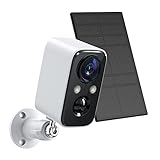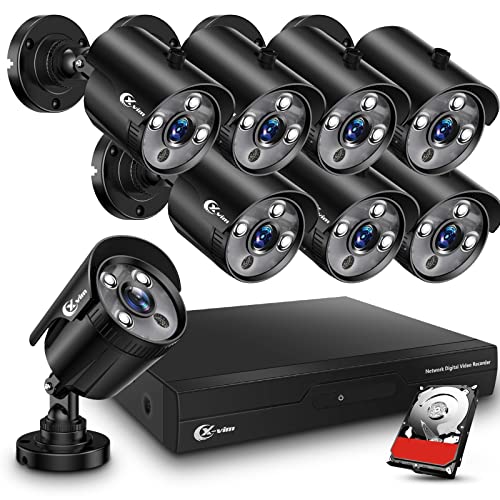
The use of security cameras has become increasingly common in modern society. These cameras are utilized for various purposes such as surveillance and crime prevention. However, a common concern among individuals is whether security cameras can function without electricity.
While security cameras require electricity to operate, there are alternative options available that allow them to work without a direct power source. These alternatives include solar-powered cameras and battery-powered cameras.
Solar-powered cameras utilize solar panels to convert sunlight into electrical energy, which is then used to power the camera. This provides a sustainable and cost-effective solution for areas where access to electricity may be limited or unreliable.
Battery-powered cameras, on the other hand, utilize rechargeable batteries as their power source. These batteries can be charged using traditional electrical outlets and can last for extended periods, providing a reliable surveillance solution even during power outages.
In conclusion, while security cameras typically require electricity to function, there are alternative options available that allow them to operate without a direct power source. Solar-powered and battery-powered cameras provide practical and efficient solutions for areas where access to electricity may be limited or unreliable.
Can Security Cameras Operate Without Electricity?
Security cameras are an essential tool in monitoring and securing properties. However, one common concern is whether security cameras can operate without electricity. While most security cameras rely on electricity to function, there are alternative options for scenarios where a power source is not readily available.
Here are some ways security cameras can operate without electricity:
- Battery-powered cameras: These cameras are equipped with rechargeable batteries that can power the device for a certain period. They are commonly used for temporary surveillance or areas where it is challenging to install electrical wiring.
- Solar-powered cameras: Solar-powered security cameras use solar panels to convert sunlight into electricity. These cameras come with built-in batteries that store the energy generated, ensuring continuous operation even during the night or on cloudy days.
- Wireless cameras: Wireless security cameras can operate without electricity by utilizing a Wi-Fi network connection. These cameras are powered by either batteries or an external power source, such as a solar panel or a power bank.
It’s important to note that while these alternative options provide flexibility in terms of installation, they also have limitations. Battery-powered cameras need regular recharging, while solar-powered cameras require sufficient sunlight exposure. Additionally, wireless cameras may have limited range depending on the strength of the Wi-Fi signal.
In conclusion, while most security cameras rely on electricity, there are options available for operating them without a direct power source. Whether it’s through battery power, solar power, or wireless connectivity, these alternative options provide viable solutions for surveillance in areas where electricity is not easily accessible.
Wired Security Camera Systems and Power Requirements
When it comes to security camera systems, one of the main considerations is the power source. In the case of wired security cameras, they typically require a direct electrical connection to function properly. These cameras cannot work without electricity and rely on a stable power supply to capture, store, and transmit footage.
The power requirements for wired security camera systems vary depending on the specific model and manufacturer. It is important to consider the power needs of the camera and ensure that the power supply can meet those requirements. In most cases, cameras will require a constant supply of electrical power to operate effectively.
Wired security camera systems are typically connected to a power source using a power adapter. The power adapter converts the electrical current from the main power source into the appropriate voltage and amperage needed for the camera. Depending on the camera’s power requirements, the power adapter may need to be plugged into a standard electrical outlet or may require a custom power supply.
It is important to note that while wired security camera systems require access to electricity, they may also have the option for backup power sources. Some cameras may feature a built-in battery backup that can keep the camera functioning in the event of a power outage. Additionally, external battery packs or uninterruptible power supply (UPS) systems can be used to provide power continuity for extended periods.
In conclusion, wired security camera systems rely on a direct electrical connection for power. They require a stable power supply to function effectively. While backup power options may be available, it is essential to ensure that the power requirements of the camera are met to maintain continuous surveillance.
Battery-Powered Security Camera Systems
Battery-powered security camera systems are an excellent solution for those seeking surveillance without the need for constant electricity. These systems are not only portable but also provide reliable security coverage in areas without power outlets.
A battery-powered security camera system typically includes one or more cameras that are powered by rechargeable batteries. These batteries can last for several weeks or even months, depending on usage and camera settings.
With advancements in technology, battery-powered security cameras now come with various features, such as motion detection, night vision, and two-way audio communication. These cameras can be easily installed indoors or outdoors, making them versatile for different surveillance needs.
Here are some advantages of battery-powered security camera systems:
- Flexible Placement: Since these cameras are not dependent on electricity, they can be placed anywhere within range of your home’s Wi-Fi network. This flexibility allows you to monitor specific areas of concern without worrying about power sources.
- Easy Installation: Battery-powered security cameras require minimal setup. Most systems only require you to mount the camera and connect it to your Wi-Fi network. This simplicity makes it an ideal option for homeowners and renters who want to enhance their security without the hassle of professional installation.
- Wire-Free Design: These cameras eliminate the need for messy and visible wires. They can be easily mounted on walls, ceilings, or other surfaces without the hassle of running cables through your home.
- Remote Access: With the help of a dedicated mobile app, battery-powered security cameras allow you to access live video footage and receive notifications on your smartphone or tablet from anywhere in the world. This feature enables you to monitor your property in real-time and stay updated on any potential security threats.
While battery-powered security camera systems offer convenience and flexibility, it’s important to note that regular battery maintenance is required. Users must recharge or replace batteries periodically to ensure uninterrupted surveillance.
Overall, battery-powered security camera systems provide an effective and convenient solution for those in need of surveillance without access to electricity. With their advanced features and easy installation, these systems offer peace of mind and enhanced security for both residential and commercial settings.
Solar-Powered Security Camera Systems
In recent years, solar-powered security camera systems have gained popularity as a reliable and sustainable solution for surveillance needs. These systems harness the power of the sun to operate security cameras without the need for electricity.
The main component of a solar-powered security camera system is the solar panel, which absorbs sunlight and converts it into electrical energy. This energy is stored in a battery, allowing the camera and other components to function even during low-light conditions or at night.
One of the key advantages of solar-powered security camera systems is their ability to operate in remote locations or areas where access to a power source is limited or non-existent. This makes them ideal for protecting properties such as construction sites, farms, and outdoor facilities.
Furthermore, solar-powered security camera systems are environmentally friendly, as they do not rely on traditional sources of electricity that contribute to carbon emissions. They provide a sustainable alternative that reduces the overall carbon footprint.
With advancements in technology, solar-powered security camera systems have become more advanced and efficient. Many systems now feature motion sensors and can send alerts and footage to a remote location via wireless networks or the internet. This allows for real-time monitoring and quick responses to potential security threats.
In conclusion, solar-powered security camera systems are an excellent option for those seeking an off-grid surveillance solution. They offer the benefits of sustainability, remote operation, and advanced features, making them a reliable choice for both residential and commercial applications.
PoE (Power over Ethernet) Security Camera Systems
PoE (Power over Ethernet) security camera systems provide a convenient and efficient way to power and transmit data to security cameras without the need for separate power cables.
The PoE technology allows the transfer of electrical power and data over a single Ethernet cable, making installation and configuration much simpler and more cost-effective. With PoE security camera systems, there is no need for additional power outlets near each camera, resulting in reduced wiring and installation costs.
One of the main advantages of PoE security camera systems is their ability to operate even during power outages. Traditional security camera systems rely on AC power or batteries, which can fail during an outage. However, with PoE technology, security cameras can be powered by a PoE switch or injector, which receives power from an uninterruptible power supply (UPS) or a backup generator. This ensures continuous surveillance and peace of mind even in the event of a power failure.
Furthermore, PoE security camera systems provide flexibility in camera placement. Cameras can be installed in remote or hard-to-reach locations without the need for separate power sources. This makes them ideal for outdoor surveillance and areas where running power cables may be difficult or impractical.
Additionally, PoE security camera systems offer advanced features and capabilities. With the power and data all transmitted through a single cable, PoE cameras can support high-resolution video streaming, audio, and other features such as PTZ (pan-tilt-zoom) control. These systems also allow for easy scalability, as additional cameras can be easily added without the need for extensive wiring and power infrastructure.
In conclusion, PoE security camera systems provide a reliable and efficient solution for powering and transmitting data to security cameras. With the ability to operate during power outages, flexibility in camera placement, and advanced features, PoE systems are an excellent choice for both residential and commercial surveillance needs.
FAQ
Can security cameras work without electricity?
Yes, there are security cameras available that can work without electricity. These cameras are powered by batteries or solar panels.
What are battery-powered security cameras?
Battery-powered security cameras are surveillance cameras that are powered by built-in batteries. They can operate wirelessly and do not require a connection to an electrical outlet.
How long do the batteries of battery-powered security cameras last?
The battery life of battery-powered security cameras can vary depending on various factors such as the quality of the battery, the camera’s usage, and the camera’s features. Some cameras can last a few months on a single charge, while others can last up to a year.
What are solar-powered security cameras?
Solar-powered security cameras are surveillance cameras that are powered by solar energy. They have built-in solar panels that convert sunlight into electrical energy to power the camera.


















